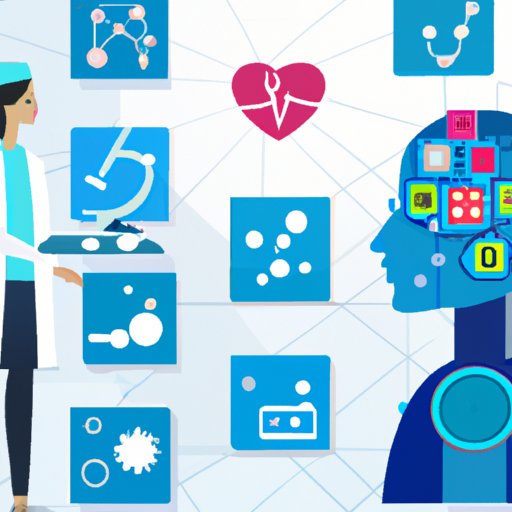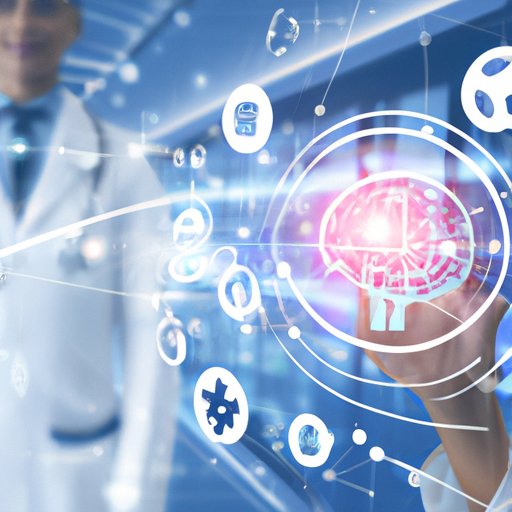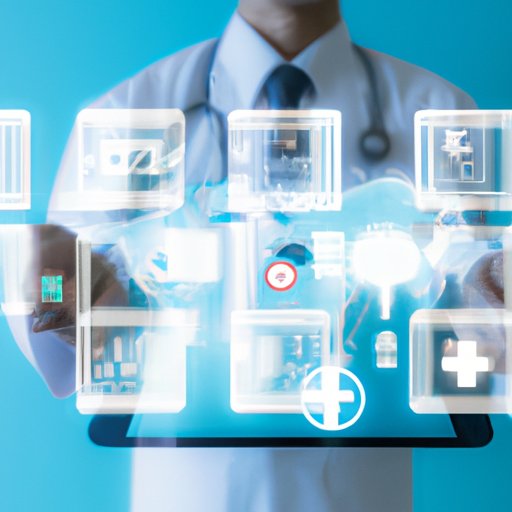Introduction
Artificial intelligence (AI) is a rapidly advancing technology that has the potential to revolutionize the healthcare industry. AI has already been used to create powerful tools for diagnosis and treatment, and it has the potential to improve patient safety, reduce costs, and provide better access to care. In this article, we will explore how AI is being used in healthcare today, and the potential implications for the future.
What is AI and How Does It Help in Healthcare?
AI is a form of computer science that enables machines to learn from data and develop the ability to make decisions without human intervention. AI can be used to analyze large datasets and identify patterns that may not be easily detectable by humans. In healthcare, AI can be used to diagnose diseases, predict outcomes, and optimize treatments. AI-powered tools are also being used to develop new drugs, identify lifestyle changes to reduce the risk of disease, and improve the accuracy of medical images.

Exploring the Impact of AI on Diagnosis and Treatment
AI can be used to improve the accuracy of diagnosis and optimize treatments. AI-enabled precision medicine uses algorithms to analyze large datasets and identify patterns that can help predict the best course of action for a particular patient. For example, AI can be used to identify which drugs or treatments are most likely to be effective for a specific patient based on their health history, symptoms, and genetics.
Benefits of AI-Enabled Precision Medicine
AI-enabled precision medicine can help reduce the cost of healthcare by reducing the need for costly and time-consuming trial and error treatments. Additionally, AI can help identify diseases earlier, leading to improved patient outcomes and reduced costs associated with long-term care. AI can also be used to personalize treatments, allowing doctors to tailor treatments to individual patient needs.
Examples of AI Applications in Diagnosis and Treatment
AI is being used in many different areas of healthcare, including radiology, pathology, dermatology, cardiology, and oncology. For example, AI-powered algorithms can be used to detect cancers on medical images, such as mammograms and CT scans. AI can also be used to identify signs of heart disease, stroke, and other serious conditions. AI-based tools are also being developed to assist with diagnosis and treatment of mental health conditions.

Examining the Benefits of AI for Patients and Providers
AI can help improve patient safety by providing more accurate diagnoses and reducing the risk of errors due to human bias. AI-based systems can also help reduce costs by streamlining administrative processes and automating repetitive tasks. Additionally, AI can help improve access to care by providing patients with faster and more efficient care. Finally, AI-powered tools can improve communication between patients and providers, enabling better collaboration and improved patient satisfaction.
Analyzing AI-Powered Tools for Drug Development
AI can be used to automate the drug development process, enabling scientists to quickly identify new compounds with potential therapeutic value. AI can also be used to identify personalized treatments based on a patient’s genetic profile and health history. By leveraging the power of AI, drug developers can speed up the process of discovering new treatments and make them available to patients sooner.
Investigating AI-Assisted Disease Prevention Strategies
AI can be used to develop predictive analytics models that can identify individuals at risk of developing certain diseases. This can enable early detection and intervention, and reduce the risk of serious complications. AI can also be used to identify lifestyle changes that can reduce the risk of disease, such as diet and exercise. Additionally, AI can be used to support public health initiatives, such as disease surveillance and outbreak management.
Evaluating AI-Enabled Medical Imaging Technologies
AI-powered medical imaging technologies can improve the accuracy of medical images, reduce the amount of time needed for analysis and diagnosis, and reduce costs associated with medical imaging. AI-enabled medical imaging technologies can also be used to detect and monitor conditions over time, enabling better patient outcomes.
Conclusion
In conclusion, AI has the potential to revolutionize healthcare by improving the accuracy of diagnosis and treatment, reducing costs, and increasing access to care. AI-powered tools are being used to develop new drugs, identify lifestyle changes to reduce the risk of disease, and improve the accuracy of medical images. As AI continues to advance, it will open up new opportunities for healthcare providers and patients alike.
(Note: Is this article not meeting your expectations? Do you have knowledge or insights to share? Unlock new opportunities and expand your reach by joining our authors team. Click Registration to join us and share your expertise with our readers.)
